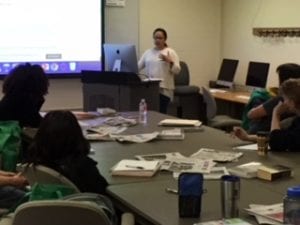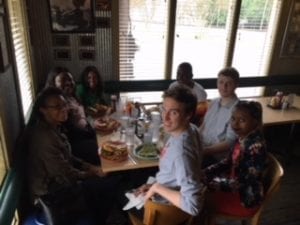For the past three January’s, I have found myself confronted by an intimidating, but exciting sight. As chair of the Hooks Institute’s National Book Award committee, I have the task of selecting five finalists from a pool of two to three dozen books focused on the history of the Civil Rights Movement and its legacy. The nominees are diverse in subject matter and style, from biographies to critical studies of art, literature, or music, from studies rooted in history to works connecting history to the unfolding movements of our own time. My task is to whittle the nominees down for the other members of the committee – this year, those colleagues were Beverly Cross (College of Education), Ernest Gibson (Rhodes College), Aram Goudsouzian (Dept.of History), and Terrence Tucker (Dept. of English).
And then the hard work begins. Every year, the quality of the finalists makes the committee’s decision very difficult. This year’s group of finalists really stretched us because these five books spanned the civil rights struggle from its early period to its contemporary legacies. Plus, they were each excellent. This year’s finalists were:
- We Were Eight Years in Power, by Ta-Nahesi Coates
- Locking Up Our Own, by James Forman, Jr.
- Harambee City, by Nishani Frazier
- My Life, My Love, My Legacy, by Coretta Scott King and Barbara Ann Reynolds
- The Making of Black Lives Matter, by Christopher Lebron
 This year’s winner stood out among this outstanding group. The winner of the 2017 Hooks Institute National Book Award, Locking Up Our Own by James Forman, Jr.’s, is a tremendous contribution to today’s vibrant discussions about mass incarceration and the criminal justice systems that continue to devastate black communities. It provides a layer of complexity to those discussions by investigating local decisions that gave rise to mass incarceration, decisions that were often endorsed by black leaders. With a compelling personal touch, Forman frames the problem as a series of smaller decisions rather than as a massive conspiracy, providing a sense of hope that there is an opportunity to incrementally confront an incrementally-constructed system. This book is a worthy winner of the Hooks Institute’s National Book Award as it illuminates readers on a central civil rights struggle of our time.
This year’s winner stood out among this outstanding group. The winner of the 2017 Hooks Institute National Book Award, Locking Up Our Own by James Forman, Jr.’s, is a tremendous contribution to today’s vibrant discussions about mass incarceration and the criminal justice systems that continue to devastate black communities. It provides a layer of complexity to those discussions by investigating local decisions that gave rise to mass incarceration, decisions that were often endorsed by black leaders. With a compelling personal touch, Forman frames the problem as a series of smaller decisions rather than as a massive conspiracy, providing a sense of hope that there is an opportunity to incrementally confront an incrementally-constructed system. This book is a worthy winner of the Hooks Institute’s National Book Award as it illuminates readers on a central civil rights struggle of our time.
It has been a privilege to serve on and chair the book award committee. Not only do I get to see a vast array of work being done by brilliant writers from a variety of fields, but I also get to serve with colleagues who share the Hooks Institute’s vision to apply the lessons of the past to impact the present. As I pass the task of chairing the committee on for next year’s award, a part of me will miss that giant stack of books staring at me next January.
By Daniel Kiel, Professor of Law, Cecil C. Humphreys School of Law. Chair, Hooks National Book Award Committee.
Hooks National Book Award Presentation and Lecture Featuring James Forman, Jr.
Thursday, January 31, 2019 | Reception 5:30 p.m. | Lecture 6 p.m.
University Center Theatre University of Memphis
Presenting Sponsor: Just City
Locking Up Our Own: Crime and Punishment in Black America by James Forman Jr. was selected as the winner for the 2017 National Book Award. In his book, Forman argues that America’s draconian sentences for drug crimes were created not only by whites but also inadvertently by exasperated African American leaders whose communities were facing an unprecedented drug epidemic starting in the late 1960s. Forman encourages a candid examination of this history to tackle criminal justice reform.
Sponsored by these University of Memphis entities: African and African American Studies, Black Law Students Association, Cecil C. Humphreys School of Law, Department of Anthropology, Department of History, Marcus W. Orr Center for the Humanities and Department of Criminology and Criminal Justice; and by Burke’s Book Store and The Wharton Law Firm.
All events are free and open to the public unless otherwise noted.
The University of Memphis, 499 University St., Memphis, TN 38152. Convenient parking is located at the public parking garage on Zach Curlin.

